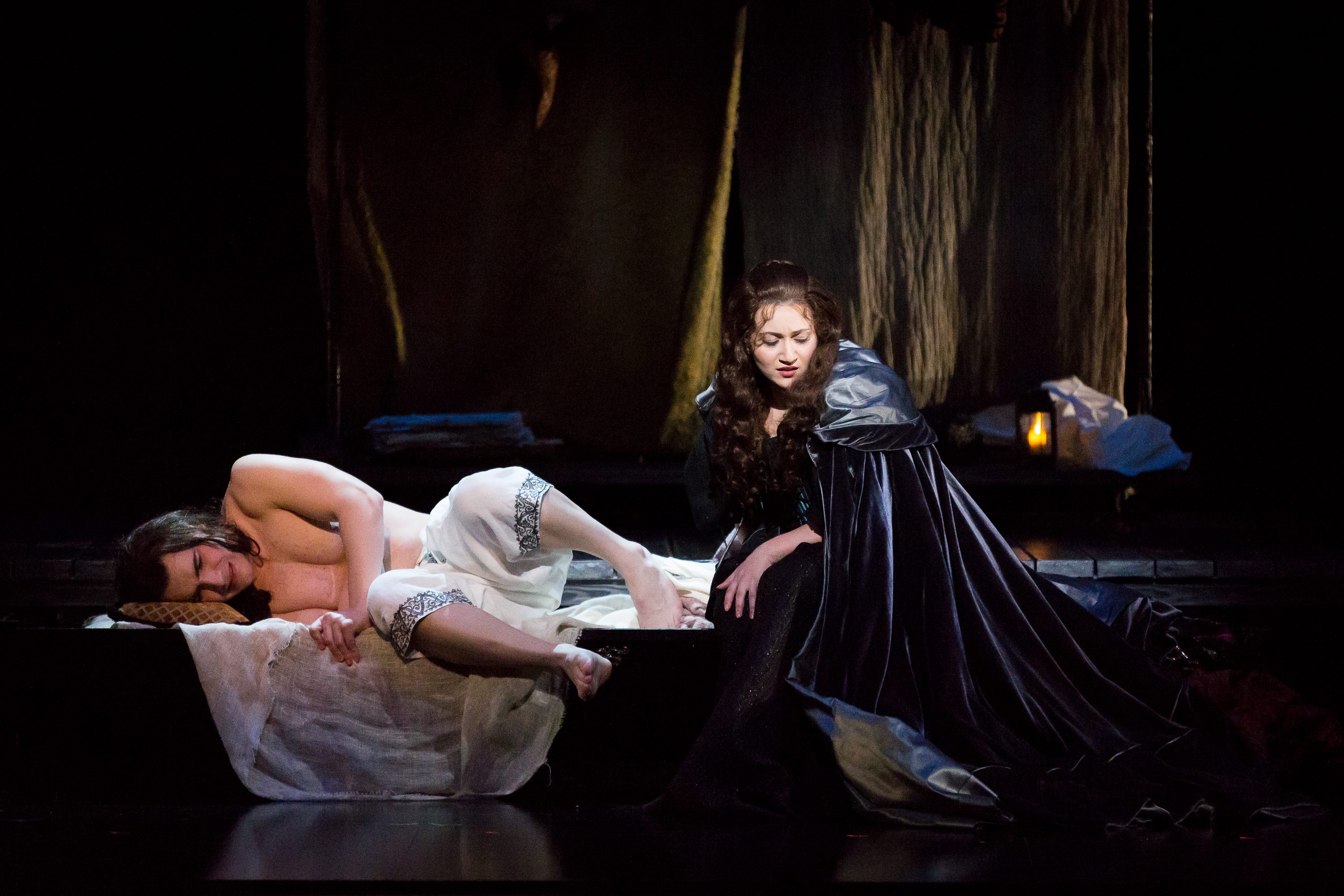Floyd’s “Prince of Players” receives effective world premiere at Houston Grand Opera

Ben Edquist and Mane Galoyan in Carlisle Floyd’s “Prince of Players” at Houston Grand Opera. Photo: Lynn Lane
Carlisle Floyd won a spot in the record books Saturday night.
With the premiere of his twelfth opera, Prince of Players, at Houston Grand Opera, Floyd reached 67 years as a creator of opera — surpassing Giuseppe Verdi by more than a decade. His Slow Dusk premiered in 1949, only 14 years after George Gershwin’s Porgy Bess.
Prince of Players, set amid 17th-century London’s theater scene, probably won’t supplant Susannah or Of Mice and Men as Floyd’s most often-heard works. Its lyrical vein isn’t as rich, and the chamber-ensemble scoring cramps Floyd’s characteristic grand-gesture style.
But Prince of Players shows that Floyd still can champion the lyrical American opera aesthetic that he largely created now that boasts a new generation of practitioners in the likes of Jake Heggie and Ricky Ian Gordon.
Based on Jeffrey Hatcher’s play Compleat Female Stage Beauty, and the 2004 film Stage Beauty, Prince of Players grows from the real-life saga of 17th-century actor Edward Kynaston, who won fame by portraying women when females were forbidden onstage. As the story unfolds, England’s King Charles II — prodded by his mistress, a would-be actress — ends the ban and orders men to portray only men.
Floyd thought Kynaston’s career crisis was quintessential operatic material. With this commission, Houston Grand Opera continues a link dating to the mid-1970s, when HGO premiered his Bilby’s Doll, and Floyd co-founded the HGO Studio training program.
Prince of Players is essentially a story of overcoming adversity, so it lends itself to bold musical strokes. At Act 1’s climax, Kynaston expresses his artistic credo–that the theater reveals life’s truths–to the strains of a broad melody that becomes a leitmotiv as Kynaston struggles in Act 2. When the actor reaches his nadir, performing in a tavern as Lusty Louise, Floyd gives him a bawdy ditty about a woman saddled with an impotent husband.
Kynaston’s salvation emerges in the form of Peg Hughes, his dresser. Early on, she reveals to the audience — not her boss — that she dreams of playing the great theatrical roles that belong to him, and Floyd provides another warm melody to help capture her fervor.
After Charles II’s edict enables Peg to take the stage, she confronts Kynaston with her own vision of acting: Rather than the stylized, formal style that he has always known, she wants to be more vigorous and realistic. At the opera’s climax, Desdemona’s death scene from Shakespeare’s Othello — with Kynaston jumping in to the title role — shows that her insight has captured his imagination, and his career can revive.
Floyd’s fiery, heaving music here is the most powerful in the opera, and baritone Ben Edquist, as Kynaston, and soprano Mane Galoyan, playing Peg, perform with vibrancy and abandon.
Yet the scene points up a paradox in the scenario Though Kynaston is the opera’s title character, he isn’t the story’s driving force. In Act 1, he’s on the receiving end of Charles’ edict; in Act 2, he relies on Peg to nurse him back to health after a nobleman he has offended has him beaten up. The crucial insight about acting comes from Peg, and in the climactic Othello scene, the fact that he has picked up on it comes almost as a surprise. Peg nearly becomes the real central character.
The score reinforces that, with Floyd’s music for Kynaston’s thoughts and emotions sometimes musically blank. When he pleads with Charles II to leave tradition in place, when Charles II denounces puritanical ways, and when theater director Thomas Betterton voices his own beliefs about theater, Floyd has them declaim their words in music that has no arresting profile. Kynaston’s description of his boyhood hardships lacks the lyricism or color that would bring long-ago feelings back to life.
In general, Prince of Players only fleetingly boasts the lyricism and dramatic punch that has been Floyd’s hallmark ever since Susannah won him acclaim in the mid-1950s.
Nor does the instrumental ensemble supply what the vocal parts lack. Yes, the score has evocative touches: the bustling, staccato woodwinds that describe the theater’s backstage activity; the mournful, simple music for oboe and drum that accompanies a bit of King Lear; the ominous tones of Desdemona’s death scene. But in big moments, or when voices well up in lyricism, the instrumental scoring sounds thin and awkward. Floyd doesn’t marshal a compact group as adroitly as Gordon or British composer Iain Bell have in their HGO commissions of recent seasons.
Nevertheless, conductor Summers and stage director Michael Gieleta shaped a production that, on opening night, was by and large energetic and committed. Edquist, as Kynaston, sang with clarity and involvement.
Though understanding what Peg had to say usually depended on reading the surtitles, Galoyan sang with a warmth that sometimes delivered the message itself.
Charles II’s jovial imperiousness came across in tenor Chad Shelton’s ringing voice and crystal-clear enunciation; Betterton, Kynaston’s friend and fellow actor, gained stature from the sonorous singing of bass-baritone Federico de Michelis. Tenor Joseph Evans brought a dash of oiliness to the role of Sir Charles Sedley, Peg’s theatrical patron and Kynaston’s nemesis, whereas tenor Scott Quinn cut a more sympathetic figure as Kynaston’s paramour, the Duke of Wellington.
Shoko Kambara’s simple set, centering on a revolving platform fitted out as the scenes demanded, counterpointed the lushness of Gregory Gale’s period costumes. When the first-night performance ended, the audience in Wortham Theater Center’s Cullen Theater greeted the veteran composer’s bow with a torrent of whistling and cheers.
Afterward, Floyd declared himself “baffled and overjoyed” by the response. “I wasn’t prepared,” he said, “for this degree of enthusiasm.”
Prince of Players runs through March 13. houstongrandopera.org.